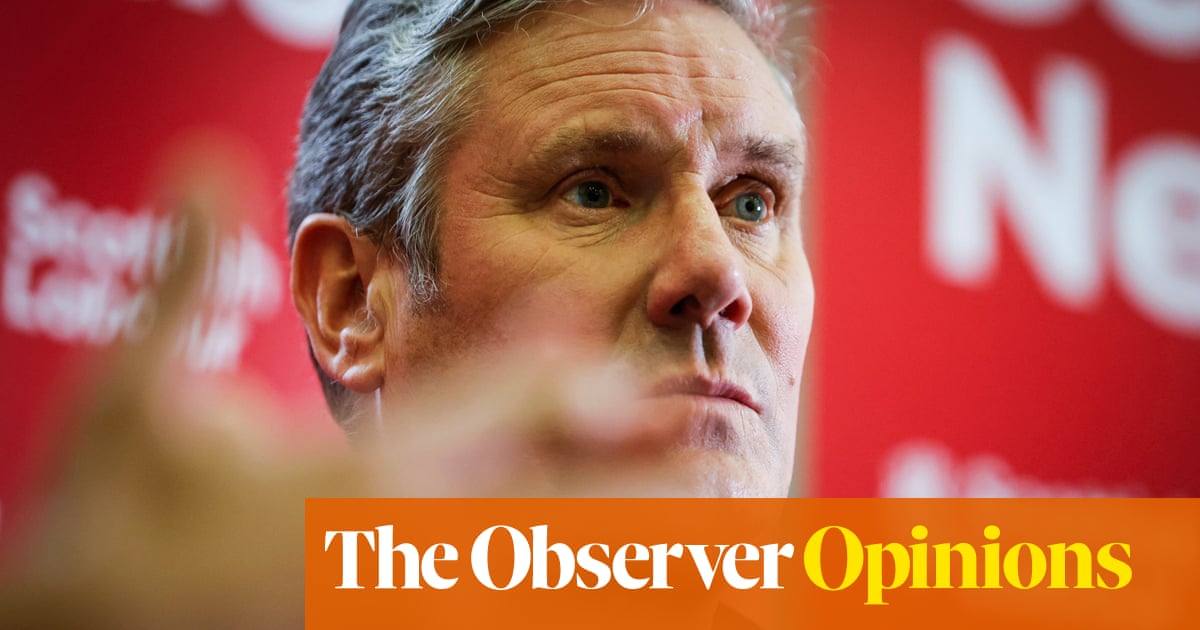
‘I wake up every morning imagining the ways in which we could still fuck it up.” So a senior member of Sir Keir Starmer’s team recently confided to me.
To understand the brain of Labour’s high command, and to fully appreciate why it so often defaults to a defensive caution, the first step is to grasp how terrified they are of losing an election virtually everyone else assumes the party must win.
Four consecutive defeats and 13 years in the wilderness of opposition have left deep psychological scars. Fear of another failure is also entrenched by Labour’s unfortunate history throughout the party’s existence of losing many more times than it has won. It is good for morale to enjoy a double-digit advantage in the opinion polls, but senior Labour people never forget how big leads have evaporated in the run-up to previous elections. Everyone of any significance on Team Starmer is especially haunted by defeats at past elections that Labour had high expectations of winning. They shudder in memory of the fate of Neil Kinnock in 1992. Ed Miliband’s presence in the shadow cabinet is a flesh-and-blood reminder of the bitter disappointment of 2015. In advance of both of those contests, the Tories inflicted a lot of economic misery on Britain. And yet the Conservatives ultimately prevailed at the ballot box because not enough voters were persuaded to trust Labour with the nation’s finances or their own livelihoods.
This exposed nerve is throbbing again as a result of last month’s setback in Uxbridge and South Ruislip. If the party could lose a byelection that it expected to win, might that be a foretaste of a much bigger and nastier shock when the general election comes? This is the chilling thought that has shivered down the spines of Labour’s senior ranks. The party’s national policy forum at the end of July heard Sir Keir tell them: “We are doing something very wrong if policies put forward by the Labour party end up on each and every Tory leaflet. We’ve got to face up to that and learn the lessons.”
He was referring to the Conservatives’ successful exploitation of hostility towards the expansion of London’s Ulez scheme, but he’s also taken a broader lesson from the Uxbridge defeat. Which is that Labour must do more across the range to fireproof itself from assault by the Tories and their allies in the rightwing media. This has amplified the obsession with reassuring swing voters that they have nothing to fear from a Starmer government while increasing the determination of the Labour leadership to close down opportunities for the Tories to go on the attack.
Some call this “getting the barnacles off the boat”, a phrase most commonly associated with the rightwing Australian campaign strategist, Sir Lynton Crosby. Others describe it as a “small target” strategy, so-called because it is designed to suppress any contentions that might work in favour of the Conservatives while making it harder for them to hit Labour.
To smother Tory attempts to depict Labour as reckless with the nation’s finances, big-ticket spending items have either been postponed, as is the case with the green prosperity plan, or obliviated, as with the erstwhile commitment to abolish student tuition fees. Labour will not put a date on when it would reverse Tory welfare cuts, including the two-child cap on child benefit that its own frontbenchers have previously denounced as “heinous” and “obscene”. Angst about these compromises and retreats runs through the party all the way up to the shadow cabinet, but not to the extent that it has triggered open revolt. “It’s a very painful place to be,” remarks one member of the shadow cabinet. “But it’s the right place to be because we have to show that we will be fiscally disciplined.”
To deny the Tories any opportunity to suggest that Labour would try to reverse Brexit or restore freedom of movement, Sir Keir has ruled out returning to either the single market or the customs union. In the past week, it has been conceded that a Labour government would, at least initially, use Tory-commissioned barges and military camps to accommodate asylum seekers on the grounds that it would have “no choice” because of the “mess we inherit”. Free school meals for all primary schoolchildren in England and universal free childcare from the age of nine months have been further sacrifices to the gods of fiscal responsibility. Faced with Tory claims that they are “anti-business”, there’s been a partial reverse on some of Labour’s commitments to strengthening workers’ rights.
This does not mean that Labour is becoming indistinguishable from the Conservatives, the glib charge from the puerile segment of the left. The subtler critique is that a strategy that focuses on safety first actually contains risks. One danger is that Labour is becoming best known not for the policies it promotes, but for the pledges it has ditched and the ambitions it has diluted. Another concern is that Sir Keir is conceding too much territory to the right and by doing so limiting Labour’s scope to deliver substantial change in government. Even some who are highly sympathetic to his relentless emphasis on winning power think Labour needs to display more confidence in both its ideas and its prospects.
There’s nothing easier than lamenting that the Labour leader is being excessively cautious. That analysis may even be correct. Yet critics, especially those who bear responsibility for past defeats, should also acknowledge why this is happening. It is 18 years since Labour last won an election. The 2019 defeat presided over by Jeremy Corbyn was Labour’s most calamitous showing at a general election since 1983 (measured by the deficit to the Tories in the share of the vote) and the most catastrophic since 1935 (if your preferred metric is how few Labour MPs were elected). A record of such abysmal failure in the competition for power means it ought not to be a surprise if Sir Keir overcorrects in the pursuit of victory.
The caution is not just a result of wanting to armour Labour against unfriendly fire from the Tories. It is also the product of an interpretation of how the electorate is feeling. “We won’t win if we don’t get the mood of the country right,” says someone close to the Labour leader. The prevalent view within Team Starmer is that voters have become too cynical about politicians as a class, too despairing about the dilapidated condition of the country and too sapped of faith that anyone has any answers to be seduced by bold promises to transform Britain. The bogus boosterism of Boris Johnson, the ruinous adventurism of Liz Truss and the severity of the cost of living crisis have seen to that. Voters are highly suspicious of grandiloquent rhetoric and expansive policies with expensive price tags.
Sir Keir was almost explicit about this when he shared a platform with Sir Tony Blair at a conference organised by the latter’s Institute for Global Change. The two men agreed that the political climate of today is starkly and grimly different to the atmosphere of upbeat anticipation that prevailed in the run-up to the landslide victory in 1997 won by Sir Tony to the soundtrack of Things Can Only Get Better. “That song resonated because it felt it was the mood of the country at the time. That’s not the mood now by a long shot,” said Sir Keir. “It is a mistake for us to speak to the country as it was in 1997. We’ve got to speak to the country as it is in 2023. The mood of the country is pretty bleak.”
The missing ingredient is hope. When it is successful in the pursuit of power, the centre-left usually prevails with recipes that blend realism and optimism. The task is to persuade people that Labour will be responsible in office while also generating some sense of excitement about what a change of government will deliver. That is lacking from how Labour is currently presenting itself because it has not found a way to punch through the miasma of fatalism shrouding Britain. This is not to argue that Sir Keir should suddenly sanction a splurge of fantastical spending promises that the public will not find credible. Nor should he try making messianic speeches that will come over as risible.
The challenge for him and his team is to make the thought of a Labour government more enthusing. Sir Keir is not wrong to think that voters need to believe that his party can be trusted with power, but it will be a mistake if he emphasises reassurance entirely to the exclusion of offering any inspiration.
Andrew Rawnsley is Chief Political Commentator of the Observer
This article was amended on 20 August 2023. An earlier version said 2019 was the Labour party’s worst general election result since 1983 when “measured by share of the vote”. To clarify: Labour received a lower overall share of the vote in three other elections between those dates; the intended reference was to Labour’s share of the vote (32.1%) when compared to that of the Conservatives (43.6%).












